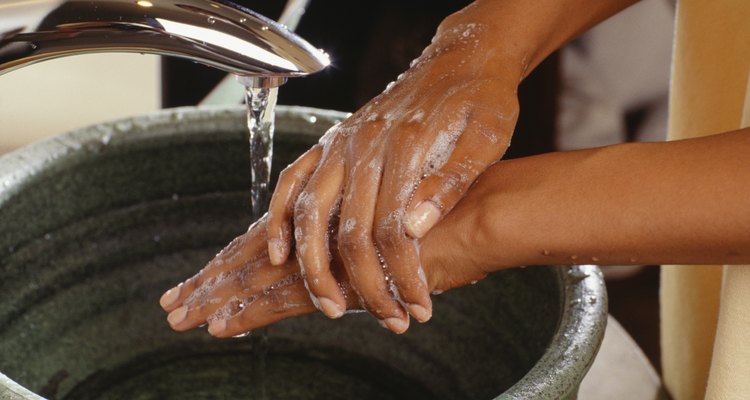
Steve Mason/Photodisc/Getty Images
Antibacterial soaps have long been favored by consumers as the result of marketing. According research by the Centers for Disease Control and Prevention, people buy antibacterial soaps because of a perceived protection offered to the user. Although many people find security in antibacterial soaps, research by the CDC found that the antibiotic found in such soap was no better at killing germs than regular hand soaps.
Skin Dryness
The most widely found effect of antibacterial soap is dry skin. In fact, the American Skin Association advises people with dry skin to avoid antibacterial soap. The powerful antibiotic agent in the soap, triclosan, strips the skin of its hydrating oils. Results can vary, ranging from mild itching and redness to irritation and flaking.
Hormonal Imbalance
Research shows that antibacterial soap can change the hormonal makeup of human and animal cells in laboratory tests. University of California, Davis scientists found that triclosan "increased gene expression that is normally regulated by testosterone," and caused glands that rely on testosterone, including the prostate, to grow larger. As a result, the scientists concluded that antibacterial soap is an endocrine-disrupting substance.
Safety Concerns
One of the skin's functions is to release and absorb various chemicals and substances. A Food and Drug Administration survey reported in the Los Angeles Times notes out of 2,517 participants of a urine study, 75 percent tested positive for triclosan. The FDA is unsure of triclosan's impact on internal organs, but laboratory animal tests show distortions in thyroid hormones. Infertility was also evident, as levels of testosterone and estrogen in the body were diminished. In 2010, the FDA announced a formal inquiry on the safety of triclosan. Research published in 2012 in "Environmental Science and Pollution Research" raised similar safety concerns, and also noted that the use of triclosan in soap could lead to resistant strains of bacteria.
No Effect Whatsoever
A growing body of evidence shows that antibacterial soaps are no better at killing germs than regular soaps. An FDA Consumer Update also published on April 8, 2010, reported that there was no "evidence that triclosan in antibacterial soaps and body washes provides any benefit" when compared to soaps that do not carry an antibacterial label.
Related Articles

What Foods Provide Calcium D-Glucarate?

What Are the Benefits of Extrapone ...
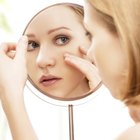
Skin Care Products That Contain ...

Estrogen in Skin Creams
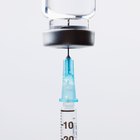
Dimethicone Hazards
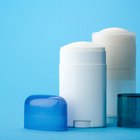
Difference Between Body Spray & ...

Benefits of Shea Butter and Coconut Oil ...
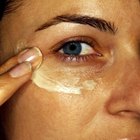
The Best Facial Moisturizers for People ...

Effectiveness of Non-Alcohol Hand ...
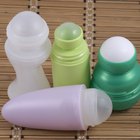
The Disadvantages of Deodorants

What Are the Benefits of Tea Tree Soap?

How to Communicate with People Pleasers

Side Effects of Monosodium Glutamate

Ingredients of Accutane
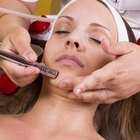
Fraxel Laser Treatment Dangers
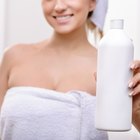
Neutrogena Ingredients

What Ingredients Are in Detergent?
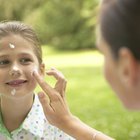
Bullfrog Sunscreen Ingredients

What Is Aloe Good For?

The Disadvantages of Saccharin
References
- Centers for Disease Control and Prevention: Antibacterial Household Products
- U.S. Food and Drug Administration: Triclosan Consumer Update
- PubMed.gov: Lancet: Effect of Hand Washing on Child Health; S.P. Luby, et al.; July 16-22, 2005
- ScienceDaily: Antibacterial Chemical Disrupts Hormone Activities, Study Finds
- Los Angeles Times; FDA Is Reviewing the Use of Antibacterial Products Containing Triclosan; Jill Adams; April 19, 2010
- Environmental Science and Pollution Research: Occurrence and Toxicity of Antimicrobial Triclosan and By-products in the Environment
Resources
Writer Bio
Jared Paventi is the communications director for a disease-related nonprofit in the Northeast. He holds a master's degree from Syracuse University's S.I. Newhouse School of Public Communication and a bachelor's degree from St. Bonaventure University. He also writes a food appreciation blog: Al Dente.
Photo Credits
Steve Mason/Photodisc/Getty Images